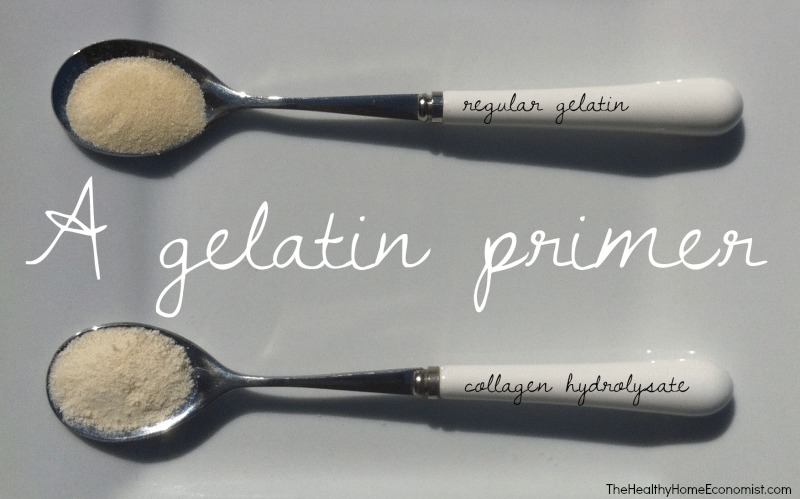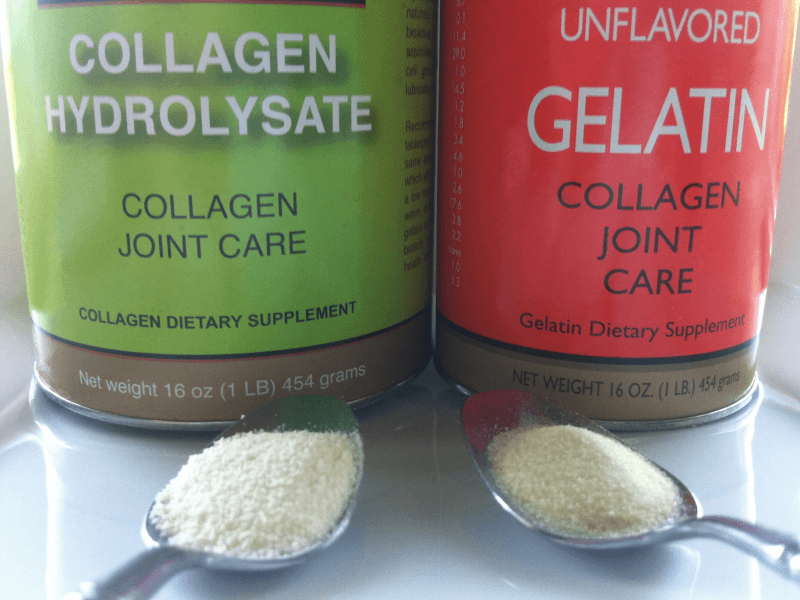The important differences between collagen hydrolysate (peptides) and gelatin, and a comparison of both to identify which one is better for anti-aging, cooking and overall health.

Gelatin (also known as cooked collagen) is a wonder food with anti-inflammatory and anti-aging qualities, as it helps to fill in the missing amino acids (the building blocks of proteins) in the standard American diet.
According to Ray Peat, Ph.D., “The degenerative and inflammatory diseases can often be corrected by the use of gelatin-rich foods” (1).
One of the greatest benefits of using gelatin is to help balance our amino acid intake. Because collagen makes up approximately 50% of the whole animal, gelatin can be used to help create a more complete protein balance in our diet. The standard American diet tends to be very high in muscle meats (such as beef, chicken, lamb, and turkey), which when not balanced by other proteins (such as eggs, fish, dairy, shellfish, organ meats) can contribute to inflammation over time (2).
The benefits of gelatin are many as it has a unique and very non-inflammatory amino acid profile, primarily consisting of glycine, glutamic acid, proline, and alanine (tryptophan and several other amino acids are completely missing).
Although these are non-essential amino acids (meaning your body can make them), many malnourished and over-stressed livers are not able to manufacture all the non-essential amino acids in the amounts demanded by the body. The liver needs an abundance of these proteins to keep functioning optimally, particularly to fuel phase 2 detoxification. This helps your body detox or “take out the trash” in our toxic world, reducing inflammation!
Gelatin versus Collagen Hydrolysate

Although the most nutrient-dense source of gelatin is homemade bone broth (since it contains minerals as well), powdered versions offer a more convenient way to consistently get it into your diet.
Processing
I spoke personally with the president of a company that produces collagen and gelatin to get the low down on exactly how collagen hydrolysate (also called hydrolyzed collagen) and gelatin are processed.
According to this reputable source, the company uses grass-fed beef hides for the raw material for their bovine products. The split hides (under the hair where the collagen lies) are put into an alkaline solution and held for a number of days where the material is broken down into smaller pieces of skin.
Next, it’s acid back washed and pumped into cooking kettles which separate tallow, skin, and collagen. The collagen is then filtered and put through a vacuum evaporator at 212 degrees F (a very delicate process). After evaporation is complete there is a four-second sanitation process at 240F degrees that kills any unwanted bacteria. At this stage, it is classified as pure collagen.
Collagen hydrolysate (quality sources): The collagen is stored in a holding tank at a higher temperature to reduce the molecular weight cleaving the amino acid bonds. This process is called hydrolysis. At the appropriate time, it is then introduced to the spray dryer whereas the product is made into a dry powder.
Gelatin (quality sources): The collagen is sent to a votator, chilled and solidified, pumped onto a drying belt, and is now considered gelatin. It is dried to under 12% moisture, milled to a granular specification and packaged.
How to Best Use Each Type of Collagen
Collagen hydrolysate – The hydrolysis process described above renders the gelatin powder more easily digestible and appropriate for those with digestive weakness and sensitivity. I find this type of gelatin best used as a protein powder with careful dosing (see Important Note below).
Mix collagen hydrolysate in drinks, shakes, smoothies, ice cream, or add a tablespoon to your favorite recipe to give it an anti-inflammatory protein boost. It will dissolve in cold liquids easily.
Having collagen hydrolysate with a meal that contains muscle meat can help balance the amino acid profile that enters your bloodstream. “If a person eats a large serving of meat, it’s probably helpful to have 5 or 10 grams of gelatin at approximately the same time, so that the amino acids enter the bloodstream in balance.” Ray Peat, PhD. (3)
Gelatin – Regular gelatin is only hot water-soluble and best used to create foods that gel (fruit snacks, healthy jello, homemade marshmallows, desserts, etc).
How Much Do You Need?
Individual needs will vary, but most people can start off with about ½ -1 tablespoon per day of collagen hydrolysate (either as powder or capsules), and increase by 1 tablespoon every two weeks or so as tolerated.
According to Ray Peat Ph.D., gelatin can make up about 30% of total protein intake, which for the typical person is about 3-6 TBL of gelatin per day (1 tablespoon of gelatin is 6 grams of protein).
Contraindications
Remember not to get too carried away with either gelatin or peptides. Adding too much too quickly can cause digestive issues: bloating, loss of appetite, stomach ache is just a few side effects.
It’s important to remember that more is not always better, especially if you are adding it to your diet for the first time.
Gelatin should be used in addition to a nutrient-dense diet and not to replace real food like homemade bone broths and grass-fed meats.
Where to Find the Best Collagen and Gelatin
Perfect Supplements and Radiant Life are the only two companies that currently offer a quality source of both collagen and gelatin that is gently manufactured and third-party tested/certified for purity (no glyphosate residue risk!).
These quality protein supplements blend easily into the beverage, smoothie, or food of your choice. Choose between grass-fed collagen, and gelatin both available in large, economical canisters.
Marine collagen is also an option for those fish-eating vegetarians.
This supplement is also available in very convenient Type II collagen capsules. This is a great option for traveling.
References
Great Lakes FAQ
Gelatin, stress, longevity by Ray Peat
More Information
The Reason You Need More Gelatin in Your Diet
5 Reasons Your Stock Won’t Gel
Bulletproof Coffee (even with added peptides) Shoots You in the Foot








I have had issues with my stomach since taking powdered collagen and wondered would I still have the side effects if I took it in capsule form?
Can collagen 2 affect gout?
If it is marine sourced collagen, possibly. I don’t believe the grassfed beef collagen would be a problem.
I was researching whether both heal the gut and it turns out that only the gelatin will do that.
Hi!! I was wondering if you have any idea why gelatin breaks me out in a severe rash. No matter how little I use. The rashes always show up the same day I use it and stay for weeks and weeks. This doesn’t happen with bone broth. Only gelatin. I also was curious if you think if gelatin gives me this reaction do you think collagen would do the same. You mentioned above that the collagen is easier on digestion so I wondered what you thought. I was thinking it’s possibly the glutamate causing it. I am curious what your well informed thoughts would be on this!! Thank you so much in advance!!
Hi, Sarah! My name is Gregory. I cook for myself a brew from chicken feet for many years. It helps me to fight the tennis elbow and keep myself in a shape so that I can keep playing tennis. It works great for me. I need no proof for that. I myself am a proof. But. The procedure is very time consuming. every 2-3 days I boil 3 chicken feet for about 3 hours. I boil them until there is just about half a glass of water left. Then the liquid becomes like a gel. And I eat it in 2 days. Works perfect. Problem is that sometimes I am not around and I burn my electric stove. Is there a small programmable device ? Like a small crock pot? The smallest I saw was 3 quarters. This is not good. Because chiken feet boiling should be all the time in the water as they are cooked. But 3 quarters pot is not good . Do you know anything that is for about a 1 quarter that is programmable. So that I can start boiling and leave home?
Hey, would you recommend the radiant life collagen over the greate lakes collagen? And would you happen to know if the radient life collagen is kosher?
I like the idea of mixing it with coconut milk and chia seeds to make a pudding. What ratios do you use?
You didn’t really say what I read this about…is there really a difference between them or is it just that one dissolves in cold water while the other needs hot water??????
Yes that is the primary difference. Collagen hydrolysate is more processed which is why it can dissolve in cold or hot water.
Get the great lakes green canister. I love the product and it dissolves perfectly! For a pudding, the gel mixed with a can of coconut milk and chia seeds is YUMMMMY !
I am so desperate as I have an idiopathic epileptic seizure Australian Shepherd. She’s on phenobarbital (harmful to the liver) zoniasmide & Keppra. In my group a lot are recommending the Great Lakes products as we are all with these babies so desperate. Can you shed some light on here with it helping with the neuro part of the brain?